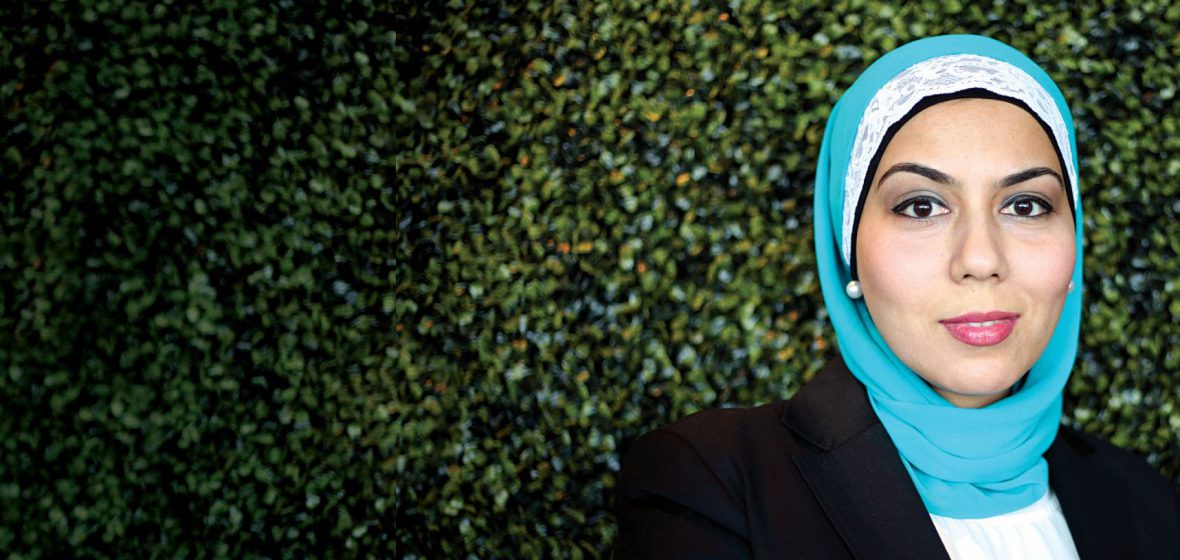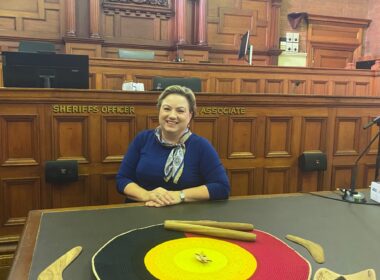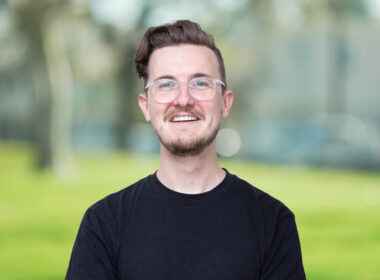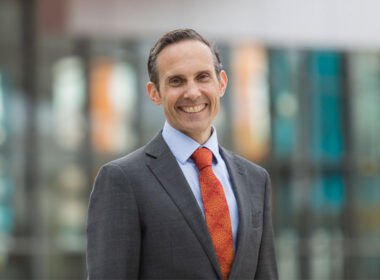Social justice advocate Mariam Zamiri Veiszadeh uses social media to fight Islamophobia. A frequent victim of trolling and a target of death threats, she talks about how September 11 changed her life – and why she puts herself through so much stress.
While Mariam Zamiri Veiszadeh has always had a strong sense of social justice, she didn’t set out to become an advocate for the Australian Muslim community. “Think about it,” she says. “If someone gave you a job description that said, ‘You can do this thing for no pay, you have to do it in your spare time and it involves death threats, extreme vitriol and being the target of everything that some people hate globally’, you’d think, ‘Why? Who would put themselves through that?’”
Over the past decade, the Sydney-based lawyer has worked in banking and consumer protection law, most recently as an in-house lawyer at Westpac, specialising in retail banking and finance. Veiszadeh is a well-known speaker, media commentator and opinion writer – and she meets newspaper editors to campaign for more minority voices in the mainstream media. She is also an ambassador for Welcome to Australia and President of the Islamophobia Register Australia – and she assists victims of Islamophobia as well as asylum seekers. She was named Westpac Group’s internal “Overall Woman of Influence 2015”, and is one of the best-known Australian Muslim advocates on social media. Last year, Elle Malaysia magazine named Veiszadeh one of 12 women helping change the world, along with US first lady Michelle Obama and actress and activist Angelina Jolie.
But if the costs are so great, why does Veiszadeh put herself out there?
“You get to a point where you’ve gained a platform,” she says. “Like it or not, that platform is there, and if I don’t speak up then this vacuum will be filled by other voices – and more extreme voices.”
Veiszadeh’s parents lived in Kabul. Her father was a successful entrepreneur and her mother a principal at a local school. Veiszadeh was born in Kabul in 1984, but when she was four, during the Soviet War on Afghanistan, the family fled. After stints in India, Germany and the Czech Republic, the family was granted asylum in Australia in 1991. They settled in Penrith in Sydney’s western suburbs, later moving to St Marys.
“We had a privileged lifestyle in Kabul and I had a nanny,” Veiszadeh says. “My brothers and sisters talk about how spoilt I was, but all I remember was being poor. Coming from a wealthy background and then arriving as an asylum seeker with nothing – no job, no extended family, no recognised education, no status and no belongings – was unbelievably hard for my parents. They did it for the family and we’re now in a situation where we can reap the benefits of all they endured.”
At school, Veiszadeh was encouraged to take up debating to help overcome shyness and the disadvantages of coming from a non-English-speaking background. The debating also fitted neatly with her ambition to become a lawyer. “I was passionate about pursuing law because of the social justice aspects of the job,” she says. “I always equated being a lawyer with being in a position of influence. I studied hard because my parents really instilled in me the importance of education.”
It was during a mock trial about underpants that her career ambitions crystallised. “I remember having to argue about a person who had developed a condition from buying underwear that someone else had tried on,” she says. “The local court judge who sat on the mock trial came over afterwards and commended and encouraged me. That was quite instrumental in making me take up law when I left school.”
It was also during this period that Veiszadeh’s background was thrust into the foreground. “It’s enough contending with all the other issues you contend with as a teenager, like not having enough nice clothes and shoes. But 9/11 made me much more conscious of where I came from.”
She recalls that on her first day at high school after the September 11 attacks other students started saying that her country was going to be bombed. To many students, the then 17-year-old quickly became associated with an event that took place on the other side of the world. “Up until then, it was the usual kids making fun of each other, but the anti-Muslim sentiment happened post-9/11,” she says. “People suddenly thought they knew so much about it – one kid at school pronounced it ‘Africanistan’ – and that component of you that didn’t previously attract attention was suddenly challenged by other people. I remember feeling very defensive that day.”
While she was uncomfortable with being thrown into the spotlight, it brought out her instinctive sense of justice. When she started studying for a dual Bachelor of Laws and Bachelor of Economics degree at Western Sydney University, she began mixing with politically engaged students. “Initially, I became active out of sheer frustration at how we were being represented in the media,” she says. “Mind you, that hasn’t necessarily changed, but it has progressed. As an Australian Muslim you’re often talked about significantly in the media rather than us doing the talking ourselves. And I wanted to change that.”
Human rights advocate and novelist Randa Abdel-Fattah was a big influence on Veiszadeh’s writing and public speaking. Abdel-Fattah, a former lawyer, was instrumental in getting Veiszadeh her first media opportunity. At the time, Veiszadeh had little idea that these ad hoc activities would morph into high-profile advocacy.
“There’s no larger organisation to take care of your issues, so I knew I needed to lead the change that I wanted to see in the world,” she says. “But before I started, I would not have envisaged doing what I’m doing and I would not have envisaged that it would attract as much vitriol as it has. You don’t really know what you’re getting yourself into.”
Veiszadeh prefers being called an “advocate” rather than “spokesperson” because she’s mindful of the diverse views among Australian Muslims. “It’s hard to be representative because we’re not at all homogenous. We’re a lot of communities,” she says. “There’s also a fine line between speaking out to shine a light on an issue and being seen as speaking out and somehow tying Australian Muslims to a crime that’s happened halfway around the world. But I do feel the burden of collective responsibility. And, as I often say, I have a massive skill set outside of being an Australian Muslim.”
As an advocate, Veiszadeh has harnessed social media to help foster change. “Twitter and Facebook are so powerful because you’re interacting with people who might not have had much to do with Australian Muslims,” she says. “Through a tweet here and there, they get to know a Muslim on a human level, rather than [as] an unidentified object that they constantly hear negative news about. Suddenly, it becomes personal, so when something happens or a politician says something ridiculous, they contemplate what effect that would have on someone like me.”
But her online stature has also made her and her husband the target of vicious online attacks. In May last year, after threatening Veiszadeh on social media, a Queensland woman was sentenced to 180 hours of community service for using a “carriage service to menace, harass or cause offence”. Later in 2015, another woman was charged with the same offence and fined $1,000 for sending death threats. Veiszadeh has recently written about the election of Pauline Hanson to the Senate, bringing another wave of online abuse.
To help manage the stress social media can cause, she regularly takes “time out”, deleting Twitter from her phone so she has to make a conscious effort to access the platform. She also sees a counsellor to deal with the stress her advocacy causes.
“There are days when I just want to bang my head on the table,” she says. “I feel there are greater forces at play beyond anything I can challenge. But it’s all about the next generation of Muslims and minority groups being able to go through high school without being bullied.
“It’s not a great way to spend all your spare time, but I think that despite how difficult it seems at times, I know things are better than they were 20 years ago. There are men and women in our community who have fought very hard for that, and I see that the hardships I endure today can make the life of someone like me in 10 or 20 years that much better.”
Today, Veiszadeh is moving into a new phase. This month, she is joining Westpac’s Inclusion and Diversity team. She hopes to drive company-wide policy around celebrating difference. She says it’s also about being in a position where she can drive change and influence others through her actions. “As I tell my husband, if I can quench my thirst for social justice during work hours then maybe I’ll be able to reduce my advocacy during my spare time.”
She is also joining Robbie Buck on a regular radio spot on 702 ABC’s Breakfast show to talk about what was trending on social media over the previous weekend. “It’s going to be an insightful and funny commentary about social media and will have nothing to do with me being a Muslim,” she says. “Radio’s great because people can just judge me on what I say and not what I look like. Wouldn’t it be great if the world worked like that?”




